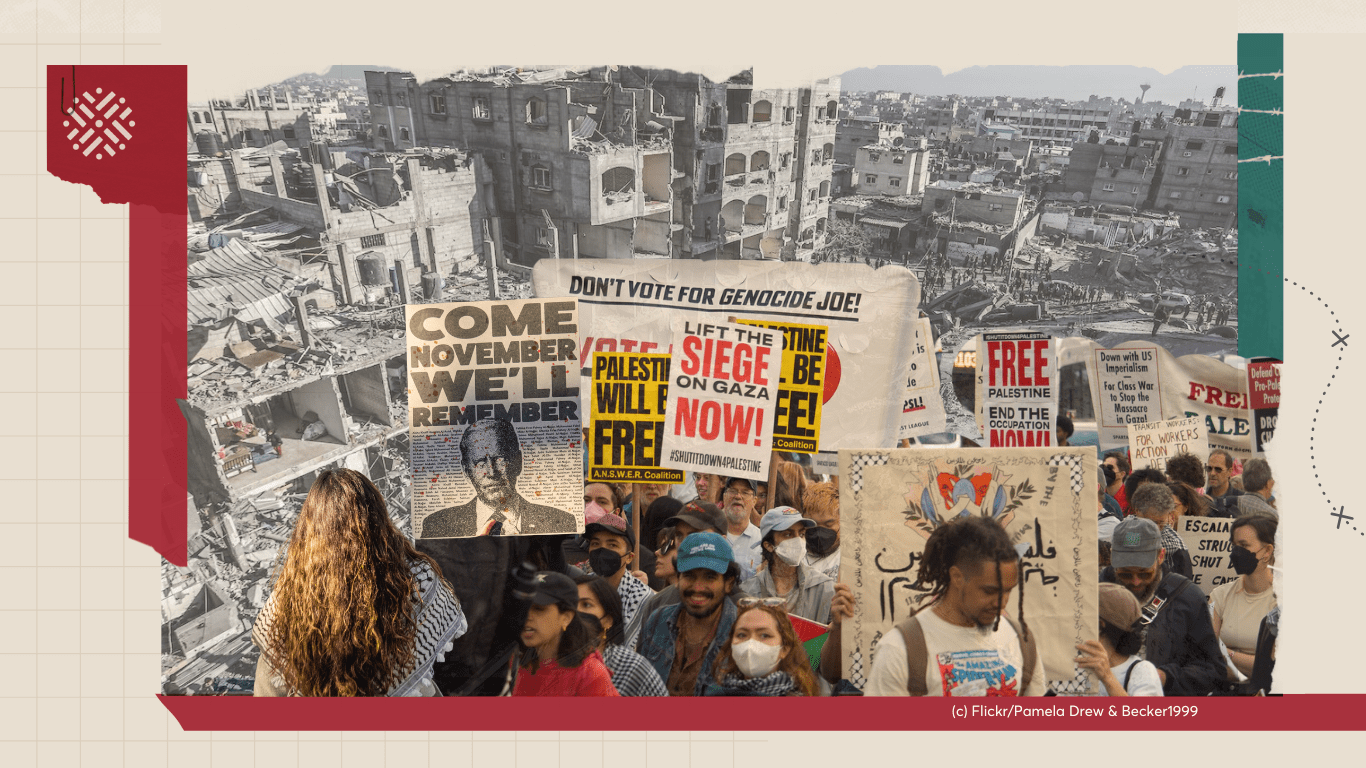
Introduction
The Democratic Party failed to recognize the profound impact of its support for the Israeli genocide in Gaza on its defeat in the 2024 US presidential elections. Many analysts have downplayed the effect of the genocide on former US Vice President Kamala Harris’s loss, emphasizing other factors that depressed voter support and turnout. The Party’s refusal to reconsider its unpopular genocidal policies in Gaza exposed a deep disconnect between its leadership and US voters. Indeed, just as discontent over the genocide played a role in driving protest votes for third parties or even defection to the Republican Party, it also demobilized voters. Additionally, the policy undermined a counterfactual scenario suggested by polling: a shift in US support away from the Israeli regime’s warfare could have garnered support and momentum for the Democratic presidential candidate.
Pre-election polls revealed notable objections to US foreign policy on Palestine. Protesting the Democratic Party’s complicity in the genocide, voters cast more than 700,000 “uncommitted” ballots in the Democratic primaries—particularly in swing states where elections have been determined by as few as 10,000 or 20,000 votes. However, US pollsters dismissed this protest vote movement, assuming it would not significantly impact the November race. Later, when Harris took over the failing reelection campaign of President Joe Biden, many analysts still overlooked the potential impact of a shift in US policy—such as through halting arms to the Israeli regime or ensuring the flow of humanitarian relief into Gaza—on mobilizing support for the Democratic candidate and curbing voter fallout. In the aftermath of Harris’s decisive defeat, some Democrats went as far as to blame pro-Palestine voters for Donald Trump’s victory. By doing so, the Party failed to recognize how apathy to genocide foregrounded the Democrats’ legacy of broken promises and their lackluster commitment to the protection of individuals’ rights and economic security, which fundamentally underpinned their loss.
This policy brief revisits polling and election data to demonstrate the effect of the Democratic Party’s unflinching support for the Israeli regime on demobilizing voters in a presidential race taking place amid a genocide, highlighting the need for a shift in US foreign policy. It emphasizes the importance of Palestine solidarity advocacy in countering the alarming global phenomenon of democratic backsliding, especially in the US. Finally, it calls for honest data collection and reporting at a time when critical action against authoritarian US policies is likely to face increasing repression under the current Trump administration—with anti-Palestinian repression serving as a template.
Anti-Genocide Voters Unseen
Since at least May 2024, polling and primary election results indicated that the Biden administration risked losing the November election due to its stance on Gaza. In key swing states, more than half of Biden’s coalition of Democrats and independents supported conditioning aid to Israel and believed the Zionist regime was committing genocide against Palestinians. Nonetheless, prominent pollsters, such as Nate Silver, David Shor, and Mark Mellman, claimed that Gaza would not be a decisive factor in the election. Surveys suggesting that Israel’s assault was not a top concern for young voters—who were demonstrably outraged by the genocide—proved misleading. Indeed, Gaza did not need to be the top issue for a majority of voters to influence the election.
The sitting Democratic president, who could casually comment on genocide while eating ice cream, became emblematic of a broader democratic rot Share on X
National polling data—often unreliable in presidential elections—failed to capture the dynamics in critical swing states that caused Harris’s slide in the race. Compared to 2020, Democrats lost an estimated 422,000 votes in swing states due to voter demobilization. Many Democrats did not turn out in the same numbers as in the previous election cycle, and some former Democratic voters defected to Trump—who swept all swing states and won the popular vote, albeit by a historically low share. Voting for third-party candidates advocating for an end to the genocide accounted for up to 29% of this Democratic vote loss in swing states.1 While this figure is significant, it did not make up the entire loss margin in these states. Instead, the true electoral impact of the genocide was its contribution to a plunge in voter turnout. Defection to Trump among the Democratic Party’s base also influenced Harris’s loss, but to a lesser extent.
According to polling by the Institute for Middle East Understanding (IMEU), 29% of former Biden voters who did not choose Harris—equivalent to roughly 122,380 votes across six swing states—were influenced by Gaza.2 This vote shift could have altered the results only if aggregated in battleground states like Michigan, Nevada, and Wisconsin—where Trump’s margins of victory were narrowest. Ultimately, this data suggests that while the genocide in Gaza may not have been the sole cause of Harris’s loss, it certainly played a role in influencing sizeable segments of the Democratic base. Yet, to fully grasp the dynamics of voter behavior, we must consider data that speaks to the overlapping reasons for anti-incumbent sentiment, such as economic dissatisfaction and genocide.
Genocide: Tip of the Iceberg of Democratic Rot
While analysts often point to economic dissatisfaction as the primary reason behind the Democrat’s loss, election explainers overlooked how the genocide reinforced voters’ dissatisfaction with the administration’s political intransigence. For these dissatisfied voters, the US response to Gaza underscored broader discontent with the Democratic leadership, contributing to their decision to sit the election out or shift allegiance in a tight race.
In the past 15 months, many Americans felt unheard, unseen, and disregarded by their leaders, especially as they struggled to make ends meet. The sitting president, who could casually comment on genocide while eating ice cream, became emblematic of a broader democratic rot. For many, the Israeli regime’s genocidal war on Gaza catalyzed a sense of profound disillusionment with an administration desensitized to immense human suffering. Regardless of the outcome, voters who felt powerless and without agency opted out, contributing to low voter turnout and protest voting.
Two key polls provide compelling evidence to support the conclusion that the genocide emphasized the existing anti-incumbent sentiment and voters’ resentment of being deprived of choice. The first is an Underpin-YouGov poll conducted just before the election.3 The second, a private poll by Swayable, showed that the mere mention of the Gaza genocide decreased voter mobilization and increased the likelihood that voters would skip the presidential race but vote in other elections. In reality, no amount of messaging could counteract the profoundly unpopular policy of the Democrat’s unflinching support for the genocide. While many factors contributed to voter demobilization, these two surveys suggest that the Biden administration’s genocidal policy significantly depressed voter turnout.
The Underpin poll surveyed 756 Democratic and independent voters across six swing states, beginning with a screening question about the voters’ most important four issues. The poll’s incidence rate suggests that 24% of these swing-state voters prioritized “Palestine/the Middle East” as one of their top four voting issues.4 Of those, 35% also ranked inflation among their top four issues. Therefore, we may deduce that 8.4% of swing state Democratic or independent voters were making their ballot decisions based on the state of the economy and the war in Gaza. This is reasonable given the context influencing these opinion polls: horrific scenes were emerging from Gaza, sympathy for Palestinians was widespread, and support for a ceasefire was at an all-time high in the lead-up to the presidential race. Similar to the IMEU poll, this survey found that 28% of these voters planned to vote for someone other than Harris.
For voters already disillusioned with the Democrats’ handling of inflation, the Gaza issue may have been the tipping point that drove them away or motivated them to abstain from voting entirely. The Swayable poll further supports this conclusion. Conducted as a randomized control trial of over 5,000 US adults across the same six swing states, it tested the impact of messaging on Gaza and the economy on the electorate. Based on data collected just two weeks before the election, the findings suggested that a policy shift, particularly forcing a ceasefire, was necessary for Harris to gain the support of key swing-state voters. In essence, messaging could not counteract the negative sentiment around the Democrats’ policy in Gaza. These results, statistically significant at a 95% confidence level, alongside the Underpin poll’s findings, show that the Democrats’ resistance to changing their genocidal policy harmed them in key states and across a wider swath of voters beyond those who see Gaza as a top-four voting issue.
In blue states, similar trends likely reduced Democratic turnout. Harris frequently sidestepped the issue of Gaza in public statements, which did not help her disengage from Biden’s unpopular administration, including its very visible foreign policy. Analysts have instead emphasized the minority voters who defected to Trump, particularly among Black and Hispanic males. While Trump did see an increase in support from these demographics, it did not stem from his appeal as much as from the Democratic voters’ frustration with the existing leadership. Sweeping anti-Democratic Party sentiments left voters disillusioned about democratic participation. While many analysts have framed the Democrats’ loss as a failure of outreach despite record spending, the real issue was the Party’s unwillingness to listen to its base—a fact underscored by its enabling of unmitigated suffering in Gaza despite overwhelming opposition from voters.
Above all, Biden’s most visible legacy, which weighed heavily on Harris’s campaign, was his unwavering support for the Israeli regime’s genocidal actions in Gaza. That legacy was, without a doubt, compounded by other factors, such as the failure of his administration to address critical issues like high living costs, the student debt crisis, and unprotected reproductive rights.
Where Polling Goes Wrong
How could so many competent pollsters and major news outlets have undercounted the impact of the Gaza genocide on the 2024 presidential election? They made several key mistakes: reliance on national statistics over state-specific data, overlooking evidence that suggested a net gain in voter support from actions to end the genocide, and reproducing misleading polling practices that systematically underestimated pro-Palestinian sentiment and its electoral effects.
While many factors contributed to voter demobilization, surveys suggest that the Biden administration’s genocidal policy was a key driver of depressing voter turnout Share on X
A central issue is the consistent misreading of polling on Gaza. Numerous surveys indicated broad disapproval of unconditional military aid to Israel and a widespread belief among US voters that Israel was guilty of committing genocide in Gaza. Still, mainstream polling organizations, such as Gallup, captured more muffled sympathy for Palestinians among American voters. Pollsters from Democratic Majority for Israel (DMFI)—a far-right-backed political action committee supporting Zionist candidates—repeatedly published memos downplaying the significance of the Gaza vote. For instance, DMFI’s analysis of early New York Times-Siena College polls focused on aggregate statistics, suggesting that only 1–2% of voters across six states considered “The Middle East/Israel/Palestinians” their top issue.5 DMFI’s findings cast doubt on whether all 1–2% of these voters were motivated by the genocide instead of support for Israel. However, that suggestion lacks credibility, given that voters who support Zionist policies would not base their votes on this issue, especially when both major candidates backed the Israeli regime. That said, even a small percentage, 1–2%, could significantly impact close races in battleground states. In fact, for key demographics in that poll—young voters (4%), voters of color (2–4%), and Democrats (3%)—the number of voters for whom Gaza was a critical issue was larger, particularly in states like Pennsylvania and Michigan (2%). In Wisconsin and Arizona, the poll showed that 7% and 6% of voters, respectively, considered foreign policy their most important issue. In fact, The NYT-Siena poll revealed that up to 13% of Biden defectors—former voters for the Democratic president—across swing states cited Palestine as their most important issue.
Similarly, in May 2024, a Vox report on national polling suggested that US support for the Gaza genocide did not primarily alienate young voters. Still, the same poll found over half of young voters listing “Israel-Palestine” among their top concerns. Beyond misrepresentation, the problem with these analyses is their overemphasis on national-level trends while ignoring how small but crucial voter shifts in key battleground states could decide the election.
Mainstream narratives, often promoted by pro-Israel centrists, suggested that maintaining the status quo on Gaza would be sufficient for Democrats to secure a victory against Trump and that outrage over Gaza did not reflect the position of a large enough segment of voters to matter. This assumption, however, is both overly optimistic and naive. Many votes were lost not only from pro-Palestine voters but also from a broader electorate that felt alienated by a government unresponsive to mass movements.
Analysts also made the fundamentally flawed assumption that support for Israel was a key determinant for Jewish voters, especially in critical states. While Jewish voters are substantial in number in some states, like Pennsylvania, they did not overwhelmingly prioritize Israel in their voting decisions—likely because there was little distinction between the candidates’ positions on this issue, as previously explained. It also remains a mistake to conflate Jewish identity with pro-Israel sentiments. That said, even pro-Israel Jewish voters backed Harris despite multi-million dollar ads in swing states convincing them to favor Trump’s positions on Israel. Ultimately, the fear of losing votes by securing a ceasefire or condemning the genocide was either minimal or unsubstantiated.
Shifting Policy Earns Votes
In contrast to assumptions about losing avid pro-Israel voters, pollsters and analysts resoundingly ignored the fact that changing US policy to pressure an end to the genocide could have gained votes. Polls consistently showed a net positive percentage of voters in key states who would be more likely to vote for Democrats if they changed their unflinching support for Israel.
In May 2024, an Americans for Justice in Palestine Action (AJP-Action) poll conducted with YouGov revealed that a net 16% of Democratic and independent voters in four battleground states, as well as Minnesota, would have been more likely to vote for Biden if he changed his policy to “no longer support Israel’s war in Gaza.” In August, an IMEU poll, also conducted with YouGov, found that a net 27% of voters in three swing states would have been more likely to support Harris if she pledged to support an arms embargo on the Israeli regime. Similarly, a Cato Institute poll in September showed that foreign policy disagreements could determine the votes of over 50% of swing-state voters, regardless of agreement on domestic policy. In October, the Underpin poll found that 78% of pro-Palestine voters in swing states (24% of Democrats and independents) would be more likely to support Harris if she had ensured an unconditional and immediate ceasefire. This data and other polling findings consistently showed strong nationwide support for halting and conditioning weapons delivery to Israel among Democrats and independents.
The above polls represent just a sample of the numerous sources, many of them underreported in mainstream media, which indicated that opposing the genocide in Gaza would have benefitted Democrats. Some polls, such as those conducted by AJP-Action in May and the Underpin and Swayable polls in October, explicitly outlined the policy changes—including anti-genocide rhetoric—that could have shifted voter support. Despite such data and unprecedented grassroots and electoral organizing in the same vein, nothing was enough to convince the Democratic Party establishment that abetting a genocide would cost them on election day.
Losing to Biased Data
Coverage that dismissed the impact of Palestine on the 2024 presidential election must be considered part of mainstream media bias toward pro-Zionist narratives, particularly on the part of editors who shied away from publishing straightforward accounts of widespread discontent with the genocide. Traditional polling institutes, like Gallup, often tell a more muted story regarding Americans’ sympathies for Palestinians. As is well understood, question-wording and issue framing can dramatically sway results, so they must be regularly tested and revised for accuracy. Otherwise, they will continue to produce biased data, as evidenced below.
Polls consistently showed a net positive percentage of voters in key states who would be more likely to vote for Democrats if they changed their unflinching support for Israeli genocidal warfare Share on X
Since 2001, Gallup has annually polled Americans on their sympathies for various countries and their comparative sympathy for Israelis versus Palestinians. Until 2003, Gallup’s standard question on relative sympathies referred to Palestinians as “Palestinian Arabs.” But when the phrasing changed to just “Palestinians,” sympathy among Democrats rose by seven percentage points. At the same time, sympathy for Israelis dropped by two percentage points among Republicans and five points among independents. Voters’ reactions to the initial phrasing were potentially driven by anti-Arab racism. In addition, the positive increase in relative sympathy for Palestinians over Israelis should have been especially noteworthy because it was recorded during the height of the Second Intifada—when sympathies toward Palestinians were diminished due to negative perceptions of armed resistance.
In a similar vein, when polls questioned Americans on their views about specific countries, Gallup referred to “Israel” by name and listed the “Palestinian Authority (PA)” in place of Palestine. Yet the PA cannot be used synonymously with Palestine as a whole or with Palestinians. Indeed, the PA governs only small parts of the West Bank and is not a democratically-elected body. It has long been seen as a subcontractor for the Israeli regime—especially in recent months—due to its collaborative security coordination with the occupying force, and there is growing discontent with it among ordinary Palestinians. Gallup also uses this country label in its general questions before asking about sympathies for Israelis versus Palestinians later in the survey. This country label and question ordering has continued despite Gallup having found that sympathy for Israelis over Palestinians is significantly higher when respondents are first asked about their thoughts on each country using the misguided “country” label.
Standard American polling is susceptible to pro-Zionist bias, and data collection that discounts the growing discontent with Israeli policies in recent years is not unusual. Considering the dynamics of US electoral politics, in which the pro-Zionist lobby far outspends any progressive pro-Palestinian supporters, it is essential to recognize who are the foremost audiences for such polls—even when political groups do not directly fund them. Operating within a system that favors, if not rewards, pro-Zionist findings to validate the positions of elected officials who persistently fund Israeli warfare—a policy that is more uncontroversially accepted than support for domestic US social policies—even standard polls are susceptible to bias. This bias plays a vital role in manufacturing broad-based support (or indifference) for Israeli warfare and occupation in Palestine. It also continues to persist even as—and perhaps especially when—elected officials are inundated with calls, emails, and protests regarding their support for a US foreign policy that funnels billions of dollars to fund Palestinian ethnic cleansing.
Pro-Palestine Votes and the Urgency of Ethical Data Journalism
Despite a majority of Americans—particularly within the Democratic base—believing the Israeli regime has been committing genocide against Palestinians in Gaza, political advisors to Biden dissuaded him from taking serious steps toward a ceasefire. They argued that such actions might harm his election prospects, a stance Harris then followed. In an interview with Politico, Zionist pollster Mark Mellman contended that “data journalists” knew Palestine would not matter in the November 2024 US presidential election. This fait accompli perspective, however, disregarded the incontrovertible evidence of widespread support for the anti-war movement in solidarity with Gaza—especially considering that no polling is as authoritative as actual voting data, such as the “uncommitted” ballots in the presidential primaries. A careful review of swing-state polling and national trends on Palestine, therefore, strongly suggests that “data journalists” would be mistaken to claim that the Gaza genocide did not cost Democrats votes, extending well beyond Arab or Muslim voters.
More importantly, the lesson from this election is that inaction on a widely unpopular genocide, coupled with the repression of pro-Palestinian voices, undermined democracy itself by rendering voters powerless and voiceless on yet another key issue. Moreover, the Gaza genocide was distinct from other key voter issues because it was a problem the White House could have addressed directly before the election. Instead, voters witnessed a Democratic president unflinchingly administering billions in US military aid and weapons to support the genocide. Democrats also silenced and vilified pro-Palestinian supporters on university campuses, at the Democratic National Convention, and within their policy platforms. Rather than protecting democracy, voters experienced firsthand how Democrats were complicit in undermining it, along with fundamental human rights and economic justice.
Recommendations
- To recover from an election in which they lost voter confidence in blue states and swing states alike, Democrats must fundamentally reassess their strategy of neglecting or suppressing the pro-Palestinian movement while simultaneously decrying right-wing agendas—of which the Zionist project is a part.
- The events of 2024 marked a pivotal moment for the Palestinian liberation movement, and advocates should reflect on the US presidential election as an event that emphasized the inseparability of Palestine from broader struggles to preserve democracy and equal rights for all. Pro-Palestinian advocates have an opportunity to collaborate with other groups that are forced today, more than ever before, to resist anti-democratic repression. Electoral organizing was and should continue to be an essential component of cross-sectional base-building when uplifting Palestine at the ballot box.
- US political leaders must confront the reality that policy change—mainly when feasible and supported by a majority of constituents—is essential to safeguard democracy. Messaging that sidestepped the genocide could not erase its impact, as it exposed a profound hypocrisy in democratic, human, and political values—particularly within progressive circles.
- Finally, media advocates and Palestinian rights groups should promote a more rigorous approach to polling and coverage of polls. Good polling research can restore democratic responsiveness and push elected leaders to represent the electorate’s views, regardless of party affiliation.
- The figures are calculated by the author from available polling data referenced in the linked spreadsheet.
- This number is the author’s estimate based on 29% of eligible vote loss. The real number could be somewhat smaller given the increase in the population of eligible voters in 2024, or slightly larger when combining loss in vote share to Trump and former Biden supporters voting third party.
- The screening question separated between “Palestine / The Middle East” and “Israel.” This allows us to safely assume that respondents who chose “Palestine” in this survey were concerned for the fate of Palestinians, which is not the case for other surveys that listed “Israel / Palestine” jointly as a single option.
- The poll’s incidence rate of 24% typically suggests the proportion of the population that passed the screening question. Drawing a random sample from YouGov’s representative panel of US voters, this should indicate that 24% of the population in those six states meet the eligibility criteria of that first screening question—meaning “Palestine/the Middle East” was among their top four voting issues. While some would suggest this overestimates the proportion of voters for whom the issue matters, it is worth considering that pro-Palestine sympathy was at an all-time high.
- The DMFI’s analyses were obtained privately by the author.
Halah Ahmad is a policy researcher, writer, and policy communications expert. Most recently, she led legislative affairs as VP for Policy at the Jain Family Institute, an applied social science research institute based in New York City. Halah also served as the US Policy Fellow for Al-Shabaka, and has conducted strategic policy research for government agencies and NGOs in Greece, Albania, Germany, Palestine, and the US. Halah received her Masters in Public Policy from Cambridge University as a Harvard-Cambridge scholar. Her work has been featured in The New York Times, Vox, The LA Times, The Hill, USA Today and other outlets.














